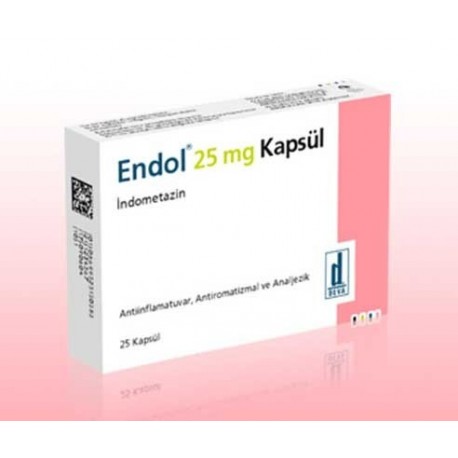Endol Indomethacin (Generic Indocin) Capsul and suppository
New product
BUY MORE PAY LESS
| Quantity | Discount | |
|---|---|---|
| 2 | 5% | |
| 3 | 10% | |
| 4 | 15% | |
| 5 | 20% |
Volume discounts
| Quantity | Discount | You Save |
|---|---|---|
| 2 | 5% | Up to $3.20 |
| 3 | 10% | Up to $9.60 |
| 4 | 15% | Up to $19.20 |
| 5 | 20% | Up to $32.00 |
More info
ENDOL 100 mg (Generic Indocin) suppository is for rectal administration.
Active ingredient
It contains 100 mg of Indomethacin.
Excipient(s): Witepsol W 45, Witepsol E 76, Setomacrogol 1000, Tween 80
1. What is ENDOL (Generic Indocin) and what is it used for?
ENDOL SUPOSITUAR (Generic Indocin) contains indomethacin as an active ingredient. It belongs to the group of drugs known as non-steroidal anti-inflammatory drugs or NSAIDs. It works by reducing the body's ability to produce inflammation that can cause pain and discomfort.
Your doctor has given you ENDOL (Generic Indocin) because you have one of the following problems:
Rheumatoid arthritis (joint disease in general)
Osteoarthritis (joint disease)
Ankylosing spondylitis (a type of arthritis that usually affects the back)
Pain, inflammation and swelling after orthopedic surgery
Musculoskeletal disorders (disorders of the muscles and bones)
menstrual pain
pain in lower back
hip joint disease
2. How to use ENDOL (Generic Indocin)?
Instructions for proper use and dose/frequency of administration
Always use ENDOL (Generic Indocin) exactly as your doctor has told you. If you are unsure, consult your doctor or pharmacist.
The amount you will use will vary depending on your situation.
Dose:
The usual adult dose is one suppository inserted into the rectum once or twice a day. One should be used at bedtime and another in the morning if needed.
Application route and method
Suppositories should not be taken orally.
It is inserted into the rectum (anus). Empty your bowels (if necessary) before use. Remove the suppository from its foil and lie on your back or side with your knees bent, pushing the pointed end of the suppository first through the anus. Lie down still for about a minute and then wash your hands. The suppository should remain in place and dissolve completely.
different age groups
Use in children
Use in the elderly
Use in the elderly
ENDOL (Generic Indocin) should be used with caution in older patients who are more prone to adverse reactions.
Special use cases
Kidney/Liver failure:
There are insufficient data for patients with renal or hepatic impairment.
If you have the impression that the effect of ENDOL (Generic Indocin) is too strong or too weak, talk to your doctor or pharmacist.
3. What are the possible side effects?
Like all medicines, there may be side effects in people who are sensitive to the substances contained in ENDOL (Generic Indocin).
If any of the following occur, stop using ENDOL (Generic Indocin) and IMMEDIATELY inform your doctor or go to the nearest hospital emergency department.
• Shortness of breath, pain in the chest, swelling in the ankles or worsening if this is pre-existing
Severe or persistent stomach pain or black stools
Yellowing of the skin and eyes (jaundice: a sign of a problem with your liver)
Allergic reactions, including skin sores and blisters
• Fever, boils and inflammation, especially in the hands and feet or in the mouth area (Stevens-Johnsons disease)
Serious skin infections if you have varicella (chickenpox) disease
All these are serious side effects. If you have one of these, you have a serious allergy to ENDOL (Generic Indocin). You may need emergency medical attention or hospitalization.
Side effects in this leaflet are listed as shown in the following categories.
Very common Common
Unusual
visible.
Rare
Very rare
Unknown
: It can be seen in at least 1 of 10 patients.
: It can be seen in less than one in 10 patients, but more than one in 100 patients. : Less than one in 100 patients, but more than one in 1,000 patients
: It can be seen in less than one in 1,000 patients.
: Less than 1 in 10,000 patients : Cannot be estimated from the available data
Known side effects:
Common: side effects seen in 1 to 10 out of 100 people
Nausea, decreased appetite, vomiting, stomach pain, abdominal pain, constipation and diarrhea,
Ulcers may develop, including perforation and bleeding of the gastric tube, stomach, small or large intestine.
Rare: side effects seen in 1 to 10 out of 10,000 people
vascular inflammation,
• Sudden swelling of the mouth, throat and pharynx, sudden drop in blood pressure resembling a shock-like situation, sudden allergic reaction
• Dizziness, anxiety, fainting, seizures, coma, numbness of the hands and feet, muscle weakness, involuntary muscle movements, insomnia, hallucinations and strangeness, tingling sensation, dysarthria, worsening of epilepsy and Parkinsonism.
Blurred vision, double vision, and eye pain
Deafness
• Edema, increased blood pressure, increased heart rate, chest pain, arrhythmia, palpitations, low blood pressure, heart failure, increased blood urea and blood in the urine
Sudden respiratory failure, asthma and pulmonary edema
Stomach inflammation, gastritis, flatulence, bleeding or perforation of the large intestine, ulcer formation
hepatitis and jaundice



